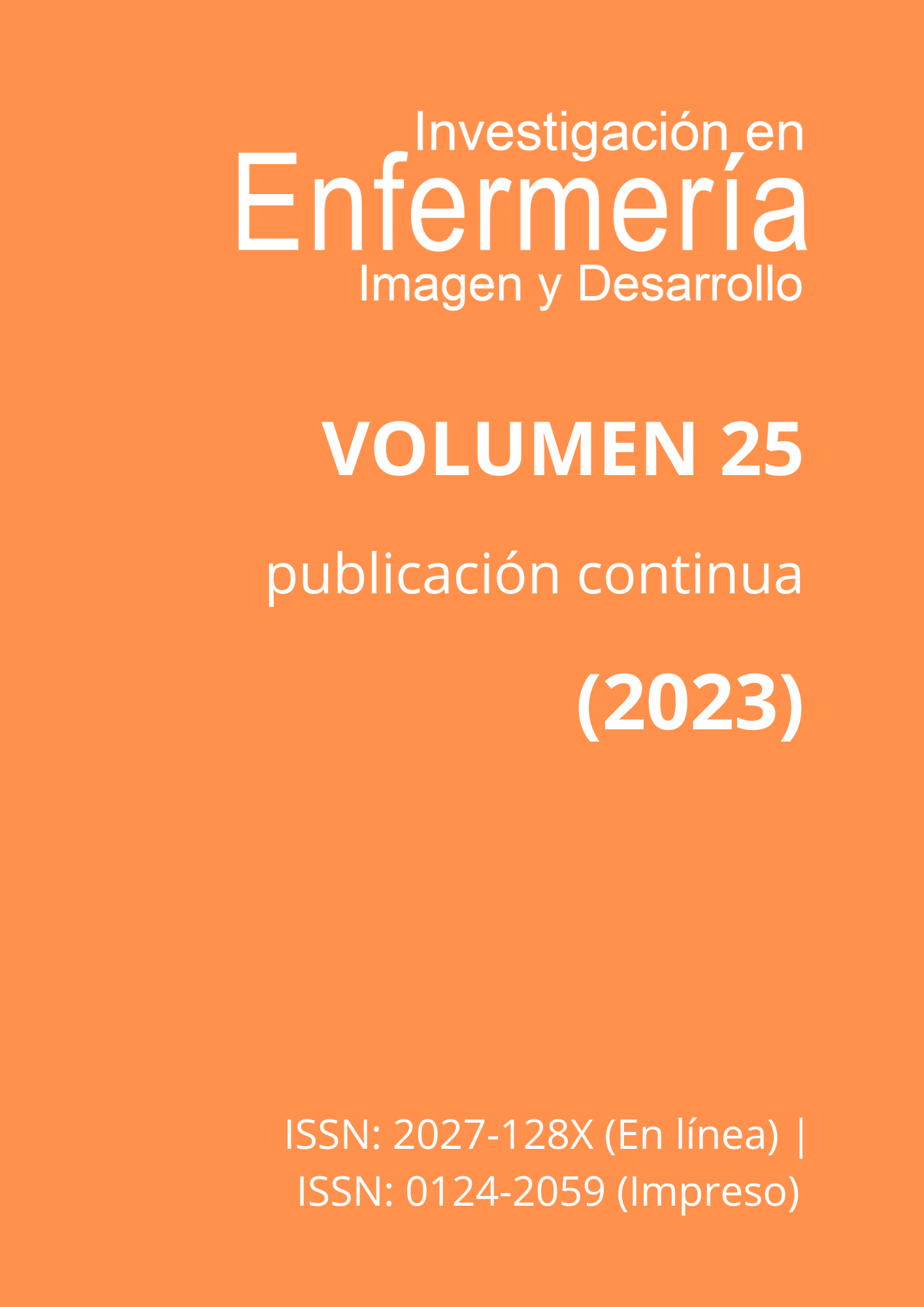Abstract
Introduction: Concern about the nursing work environment has become even greater since the Covid-19 pandemic, which affected the quantity and quality of nursing personnel around the world. Goal. To describe the work environment of nurses who perform care functions in a hospital in Bogotá, Colombia. Method: Descriptive exploratory study, with a correlational component. The ENLASA questionnaire was sent to all care nurses at the hospital under study through RedCapÒ. Results. The complete questionnaire was answered by 50% of the care nurses (49 nurses) of the institution and invited to participate in the study. 57.1% of the respondents considered the work environment unhealthy. The dimension of structural elements was considered unhealthy (64.49/100), and that of organizational processes as healthy (71.18/100). The unhealthy subdimensions were, in structure, nursing resource planning (54.66/100) and human resource policies (58.91/100) and in processes, nurse-organization interaction (63.10/100). ) and autonomy (66.07/100). No association was found between sociodemographic variables and the nursing work environment. The only statistically significant association between work environment and results was related to motivation to work. (Phi 0.362, p=0.040). Conclusions. It is suggested to intervene the dimensions and subdimensions identified as unhealthy, and continue monitoring this phenomenon.
Wong FKY, Liu H, Wang H, Anderson D, Seib C, Molasiotis A. Global Nursing Issues and Development: Analysis of World Health Organization Documents. J Nurs Scholarsh [Internet]. 2015 Nov;47(6):574–83. http://doi.org/10.1111/jnu.12174
Peña Alfaro BS. Desarrollo y validación del instrumento ENLASA-Enfermería para la evaluación de un entorno laboral saludable en el ámbito hospitalario. Universidad Nacional de Colombia; 2021.
Kassahun CW, Abate AT, Tezera ZB, Beshah DT, Agegnehu CD, Getnet MA, et al. Working environment of nurses in public referral hospitals of West Amhara, Ethiopia, 2021. BMC Nurs [Internet]. 2022 Dec 24;21(1):167. http://doi.org/10.1186/s12912-022-00944-9
Gurková E, Mikšová Z, Labudíková M, Chocholková D. Nurses’ Work Environment, Job Satisfaction, and Intention To Leave - a Cross-Sectional Study in Czech Hospitals. Cent Eur J Nurs Midwifery. 2021;12(4):495–504. http://doi.org/10.15452/cejnm.2021.12.0019
Aiken LH, Simonetti M, Sloane DM, Cerón C, Soto P, Bravo D, et al. Hospital nurse staffing and patient outcomes in Chile: a multilevel cross-sectional study. Lancet Glob Heal. 2021 Aug 1;9(8):e1145–53. http://doi.org/10.1016/S2214-109X(21)00209-6
Scholarworks S, Moses TC. Improving Staff Retention in Adolescent Psychiatric Residential Treatment Facilities [Internet]. Walden University; 2021 [cited 2022 Aug 29]. Available from: https://scholarworks.waldenu.edu/dissertations
Mabona JF, van Rooyen D, Ham-Baloyi W Ten. Best practice recommendations for healthy work environments for nurses: An integrative literature review. Heal SA Gesondheid. 2022;27. http://doi.org/10.4102/hsag.v27i0.1788
Breš An Id M, Erčulj V, Lajovic J, Ravljen M, Sermeus W, Tefan Grosek Sˇ. The relationship between the nurses’ work environment and the quality and safe nursing care: Slovenian study using the RN4CAST questionnaire. 2021; https://doi.org/10.1371/journal.pone.0261466
Wiskow C, Albreht T, Pietro C De. How to create an attractive and supportive working environment for health professionals [Internet]. Health Systems and Policy Analysis. 2010. Available from: http://www.hospage.eu/pdf/How_to_create_an_attractive_and_supportive_working_environment_for_health_professionals.pdf
Huang X, Wang L, Dong X, Li B, Wan Q. Effects of nursing work environment on work‐related outcomes among psychiatric nurses: A mediating model. J Psychiatr Ment Health Nurs [Internet]. 2021 Apr 8 [cited 2022 Aug 28];28(2):186–96. https://onlinelibrary. http://doi.org/10.1111/jpm.12665

This work is licensed under a Creative Commons Attribution 4.0 International License.
Copyright (c) 2023 Investigación en Enfermería Imagen y Desarrollo


